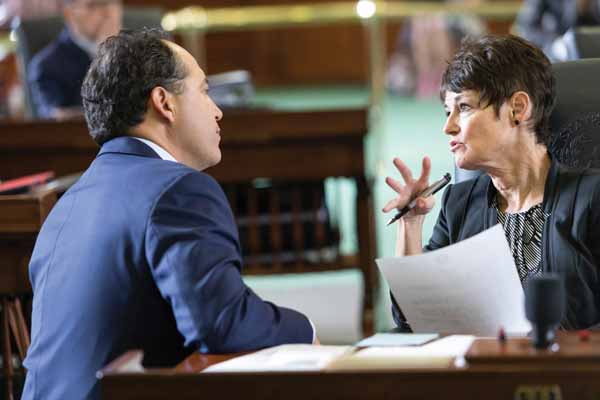
Charting Medicine’s Statehouse Progress
TMA went into this session looking to attack insurer network inadequacy and health plans’ use of care-impeding prior authorization demands.
On both fronts, medicine scored solid legislative wins that will make it easier for patients and physicians to know who’s in network, and provide needed transparency on preauthorization requirements. And on surprise billing, medicine turned what could’ve been a disastrous bill into something more palatable.
Senate Bill 1742 by Sen. Jose Menendez (D-San Antonio), one of medicine’s biggest legislative victories, will require health plans’ directories to clearly identify in-network physicians, with separate headings required in the directory to categorize physicians in several different types of specialties, including radiologists, anesthesiologists, emergency department physicians, and others.
Dallas cardiologist Rick Snyder, MD, says SB 1742 carries four powerful benefits to address network adequacy. It will:
• Simplify the process for patients to compare different plans;
• Exert market pressure on insurers to address deficiencies in their networks;
• Make it easy for patients and family members to make sure all members of a care team are in network; and
• Allow physicians to see whether a specialist needed to co-manage a patient is in network.
“Initially, we’re starting just with the specialties that are most commonly associated with a surprise-billing event: those are the hospital-based specialties,” Dr. Snyder said. “So if you’re at Presby [Presbyterian Hospital in Dallas], for example, and you’re looking at Blue Cross Blue Shield and you look under ‘anesthesia’ and there’s no physicians in network for anesthesia at that hospital, you might want to look at a different plan. So it empowers the patients when shopping for plans.”
SB 1742 also requires state-regulated health maintenance organizations (HMOs) and insurers offering preferred provider organization (PPO) or exclusive provider organization plans to post any prior authorization requirements on the internet; introduces new requirements for those insurers to post notice of prior authorization changes; creates a joint interim committee to study prior authorization and utilization review during the interim session; and opens the door for utilization reviews to be conducted earlier in the appeal process by a physician in the same or similar specialty as the physician requesting treatment approval.
As for balance billing, Senate Bill 1264 by Sen. Kelly Hancock (R-North Richland Hills) initially threatened to give health plans disproportionate control over what physicians would be paid for certain out-of-network care. But TMA worked with Rep. Tom Oliverson, MD (R-Cypress) to craft an imperfect but improved replacement bill, featuring an arbitration process that takes the patient out of surprise-billing battles while giving physicians a fairer shake on payment. (See “Swinging for Fairness,” page 30.)
On a significant issue contributing to balance billing – network shortfalls – House Bill 3911 represents progress. Authored by Rep. Hubert Vo (D-Houston) and sponsored by Sen. Donna Campbell, MD (R-New Braunfels), the bill requires the state insurance commissioner to examine PPO plans for network adequacy at least once every three years.
Senator Campbell told Texas Medicine discussions on balance billing during the past few sessions typically have centered on out-of-network practitioners and facilities, without considering the role health plans and network adequacy play. She says with HB 3911, PPOs will be held accountable to the Texas Department of Insurance the same way HMOs have been.
“We pay our insurance premiums every month to get the care that [we] need if we need it. Insurance companies are supposed to pay,” she said. “Insurance companies have gotten more onerous for providers trying to get paid. This is just a small thing, but if it helps in any big way, then that’s what we need.”
Several other insurance bills important to medicine also reached the governor’s desk. Among them:
• House Bill 170 by Rep. Diego Bernal (D-San Antonio) requires certain health plans that cover a screening mammogram to provide at least the same level of coverage for a diagnostic mammogram.
• Senate Bills 747 and 748 by Sen. Lois Kolkhorst (R-Brenham) collectively provide and set up funding for newborn genetic screening tests. SB 747 requires HMOs to cover newborn genetic screening tests as part of a well-child exam, and also prohibits plans that provide maternity coverage from excluding or limiting coverage for those tests.
• House Bill 2041 by Representative Oliverson will require freestanding emergency centers to post conspicuous notices that let patients know the facility or the physician may be out of network, and to provide a disclosure statement listing possible observation and facility fees.
• House Bill 3041 by Rep. Chris Turner (D-Grand Prairie) requires health plans to allow a physician to request renewal of a prior authorization at least 60 days before it expires.
Tex Med. 2019;115(8):18-19
August 2019 Texas Medicine Contents
Texas Medicine Main Page